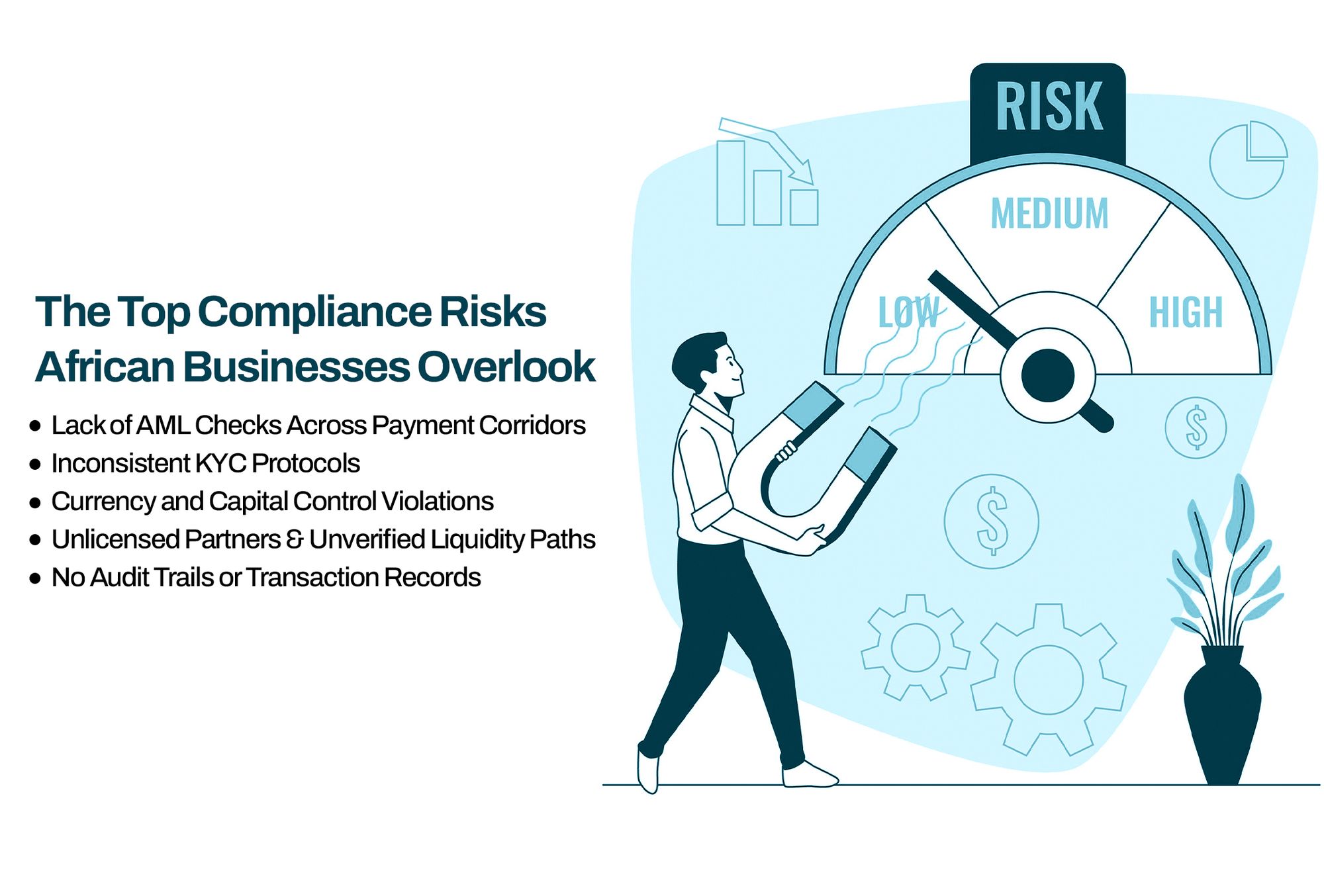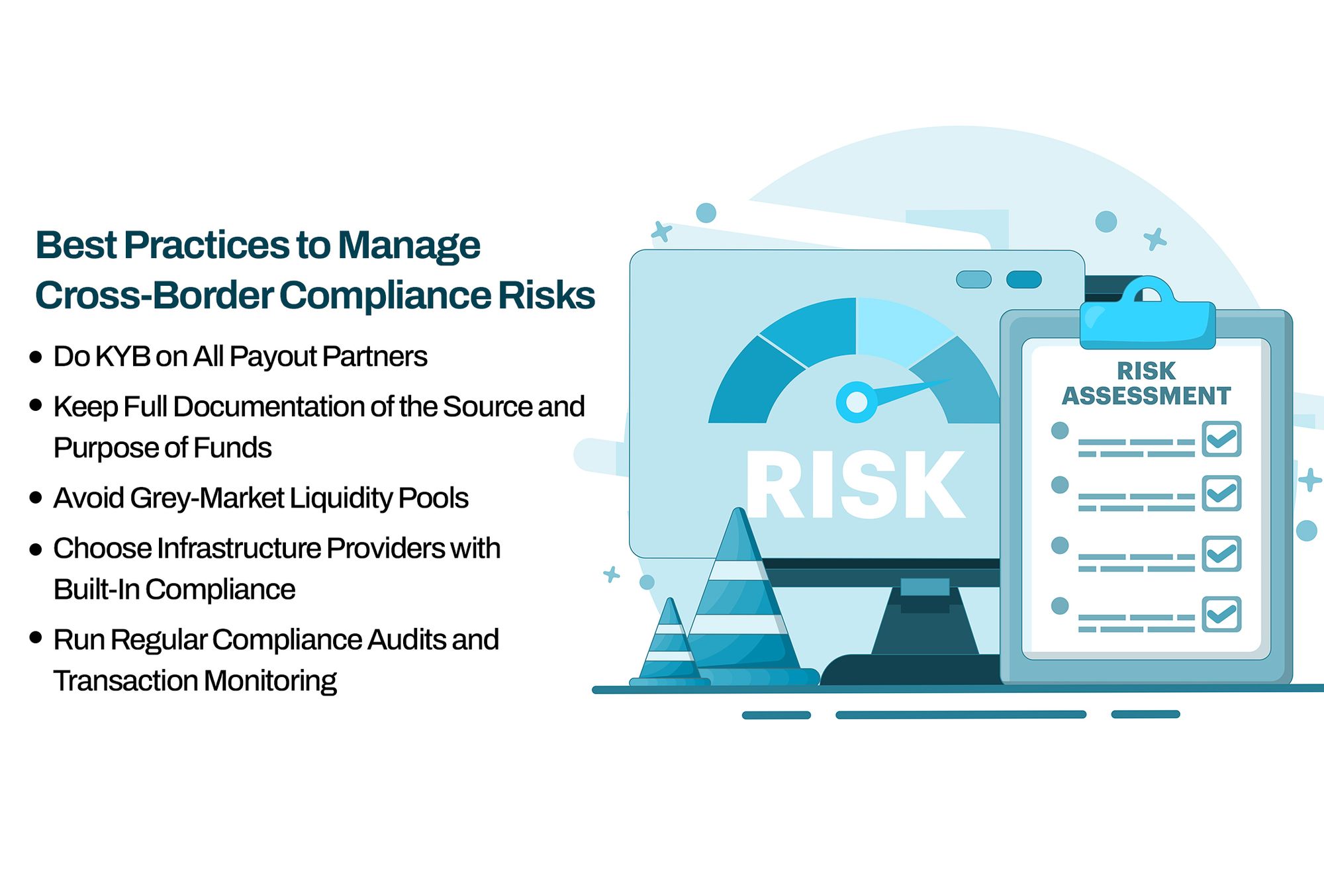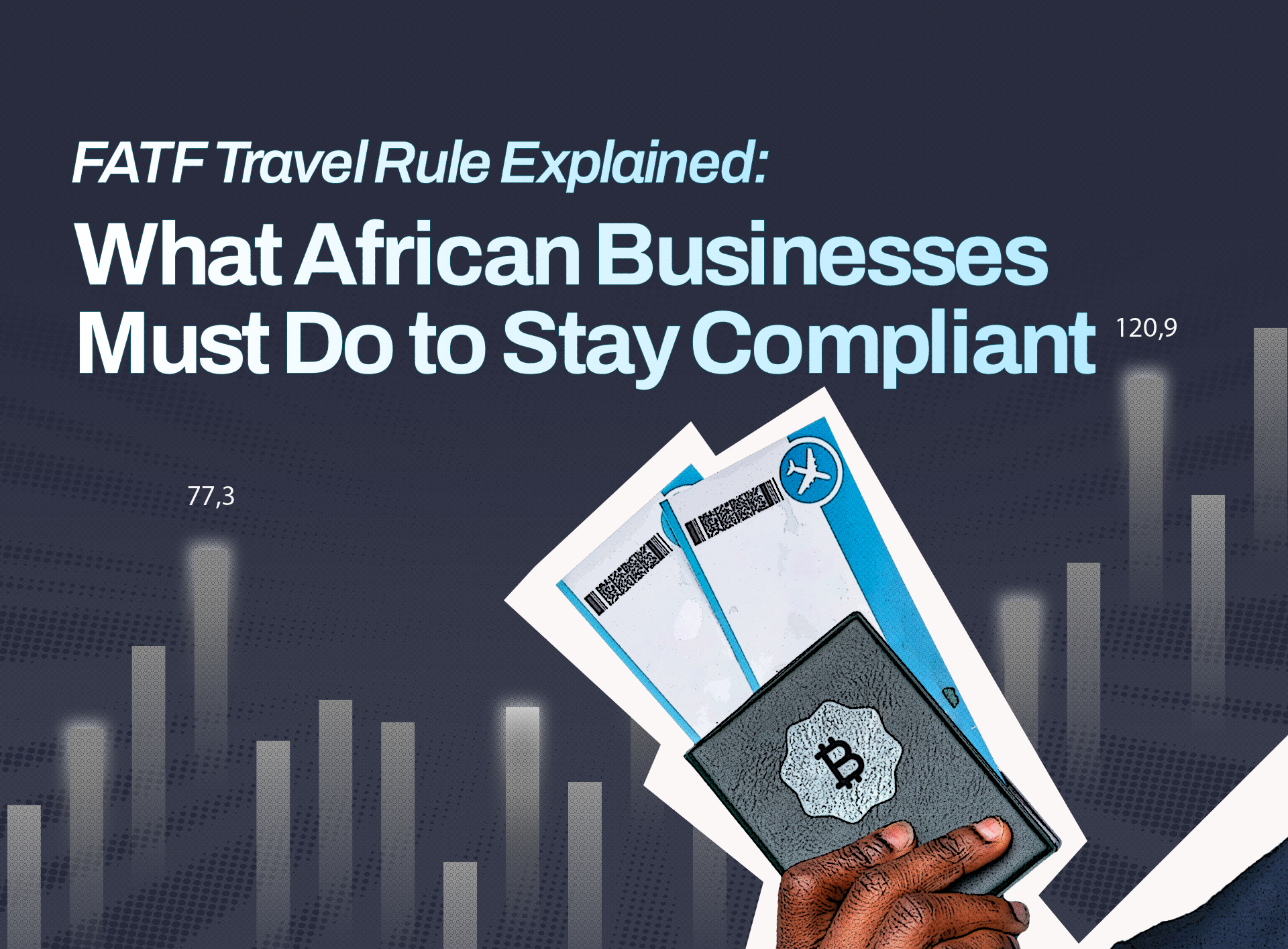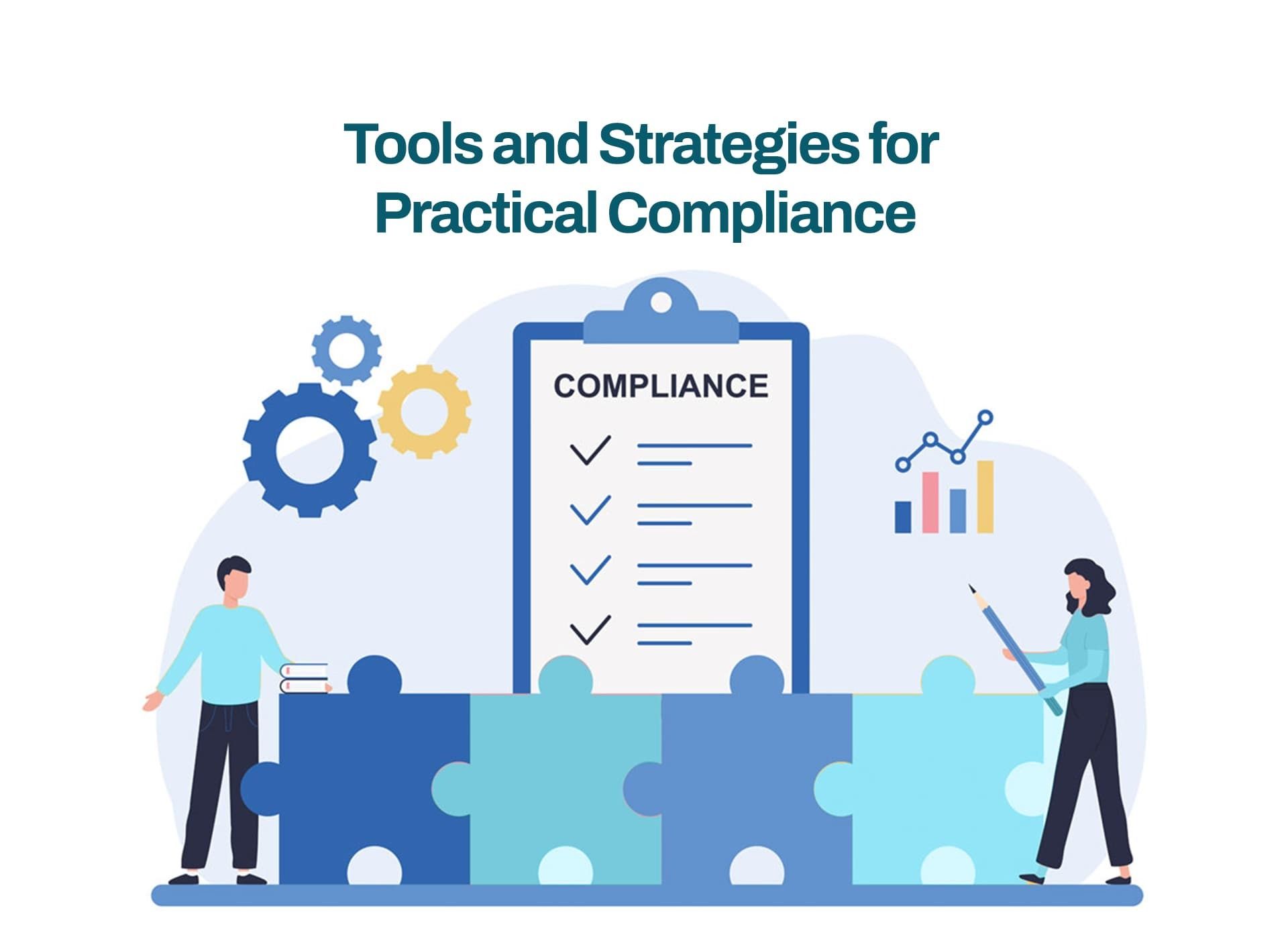Table of Contents
- The Top Compliance Risks African Businesses Overlook
- Who's Most at Risk? Business Profiles That Need to Pay Attention
- Best Practices to Manage Cross-Border Compliance Risks
- How Regulatory Environments Differ Across Key Markets
- How Obiex Stays Compliant in the Crypto Market
- To Recap
- FAQs
Cross-border payouts in Africa often happen without proper compliance checks.
Many business leaders don’t fully understand the laws in each country in which they operate.
And when rules are broken, even by mistake, the results can be serious. It could lead to frozen funds, legal penalties, and loss of trust.
In this article, we will walk you through the top compliance risks that many African businesses often overlook and share some tips on how Obiex stays compliant in the crypto market.
The Top Compliance Risks African Businesses Overlook
1. Lack of AML Checks Across Payment Corridors:
Anti-Money Laundering (AML) compliance isn’t optional. It’s a legal requirement in every financial corridor. Yet, many African businesses fail to enforce consistent AML checks across all payment routes, especially when moving funds through non-traditional channels like crypto or third-party aggregators.
For example, if a Nigerian fintech sends USDT to Kenya through a partner exchange that lacks clear AML policies, both ends of the transaction may face scrutiny from regulators.
Poor AML controls are one of the leading causes of funds being flagged or frozen during cross-border settlements. Non-compliance could lead to investigations, blacklisted wallets, or even losing access to essential banking or liquidity partners.
2. Inconsistent KYC Protocols:
Know Your Customer (KYC) rules must be consistently applied to both senders and receivers, but many African businesses only collect data from one side.
This “half KYC” approach creates serious compliance gaps. For example, a remittance service may verify the identity of the sender in South Africa but fail to collect proper documents from the receiver in Ghana.
This mismatch is a red flag for regulators and can trigger transaction holds or audits.
Inconsistent KYC not only risks penalties. It can also slow down settlements and hurt your brand’s credibility with partners and clients.
3. Currency and Capital Control Violations:
Many African countries have strict foreign exchange (FX) rules and capital control laws that limit how much money can be moved in or out.
Businesses that ignore these rules, intentionally or not, can face severe fines, frozen bank accounts, or even criminal charges.
For instance, Nigeria's Central Bank has specific limits and licensing rules around USD remittances and crypto transactions. Violating these laws can block your access to local payment rails or expose your firm to enforcement actions.
It's essential to understand the legal limits in each country you operate in.
4. Unlicensed Partners & Unverified Liquidity Paths:
Relying on unlicensed exchanges, informal OTC desks, or unregistered liquidity providers is one of the most dangerous mistakes in cross-border payouts.
These entities may not follow basic compliance practices, leaving your business exposed.
A partner’s failure to comply with AML/KYC rules can directly impact your own legal standing.
In 2023, a major East African fintech was hit with sanctions after one of its crypto liquidity partners was found to be involved in laundering illicit funds.
Even if your business was not directly involved, regulators treat third-party failures as shared responsibility.
Always vet your partners and demand transparency around their licensing, compliance frameworks, and liquidity sources.
5. No Audit Trails or Transaction Records:
If you cannot clearly show regulators who sent what, to whom, when, and why, you’re at serious risk.
Many African businesses, especially those handling crypto, don’t maintain comprehensive audit trails for every transaction. This is a major oversight.
Audit trails are your first line of defence in the event of an investigation, customer dispute, or regulatory review. Without them, proving compliance is nearly impossible.
The Central Bank of Kenya and Nigeria have both increased scrutiny on crypto payouts in the last year, requesting detailed transaction logs and partner due diligence records.
If your platform can’t produce these within hours, you may face asset freezes or suspension of business operations.

Who's Most at Risk? Business Profiles That Need to Pay Attention
1. Remittance Startups Using Stablecoins:
Startups offering remittance services via stablecoins like USDT or USDC face serious compliance challenges.
While using crypto makes transfers faster and cheaper, these businesses often operate in a grey area when it comes to Anti-Money Laundering (AML) and Counter-Terrorism Financing (CFT) rules.
According to the Financial Action Task Force (FATF), virtual asset service providers (VASPs) must comply with the same AML/CFT standards as traditional money services.
Many African remittance startups fail to meet these standards due to limited resources or a lack of clear local regulations. But ignoring them can lead to account closures, blocked transfers, or even criminal investigations.
If you're sending crypto across borders, you must verify sender and receiver identities, understand the source of funds, and monitor transactions for red flags.
2. Marketplace Platforms Paying African Sellers:
E-commerce and marketplace platforms that pay African sellers in USDT or other crypto are walking a tightrope.
These platforms often serve sellers across several countries, each with its own regulatory expectations. If even one country in the transaction flow has strict crypto or forex rules, the entire payout chain can be affected.
Platforms that don’t collect proper KYC data or report suspicious activity may face sudden restrictions, delayed settlements, or reputational damage. The risk gets bigger as platforms scale.
Without a strong compliance infrastructure, they could be shut out of local banking systems or lose access to key liquidity providers.
3. Treasury Teams Running Multi-Country Crypto Operations:
Treasury managers at African fintechs expanding across borders are under intense pressure to move funds quickly, safely, and in full compliance.
If you’re managing stablecoin flows in Kenya, Ghana, Nigeria, and South Africa, you’re likely dealing with four different sets of tax rules, exchange controls, and reporting requirements.
Missteps can lead to frozen accounts, tax penalties, or regulatory blacklisting.
One major risk is poor documentation, not tracking the origin and purpose of transfers.
Another is failing to flag suspicious volumes or counterparties. Even if the business itself is legitimate, regulators may interpret non-compliance as an attempt to hide illicit activity.
4. OTC Desks Trading USDT or BTC in Bulk:
Over-the-counter (OTC) crypto desks handling large trades of USDT or BTC are prime targets for regulatory scrutiny. In bulk transactions, a single compliance failure can cost millions.
African OTC desks often deal with high-net-worth clients or institutional traders, but without strong compliance controls, they may unknowingly facilitate money laundering.
Regulators are now demanding detailed audit trails and proof of customer due diligence.
Desks that rely on informal networks or neglect transaction monitoring are at high risk of losing access to key banking or crypto exchange partners.
Staying compliant is not just about avoiding penalties. It’s about preserving your ability to operate.
5. African Web3 Companies with Global Teams or Clients:
Web3 startups building decentralised apps, DAOs, or DeFi tools across borders often make international crypto payments to team members, contributors, or clients.
But many don’t realise that paying salaries, bounties, or grants in USDT or BTC can trigger compliance requirements in both the sending and receiving countries.
For example, a Nigerian-based DAO paying a South African developer in USDT might be subject to both countries’ tax, remittance, and foreign currency rules.
Additionally, making payments without proper KYC checks, contracts, or accounting can raise red flags.
In jurisdictions where crypto is tightly regulated, even well-meaning Web3 projects can face enforcement action for unknowingly violating local laws.
These companies must ensure that their crypto treasury systems are built with compliance from day one, or risk painful legal consequences later.
Best Practices to Manage Cross-Border Compliance Risks
1. Do KYB on All Payout Partners:
Know Your Business (KYB) isn’t optional. It’s a legal requirement in most jurisdictions and the first defence against bad actors.
African businesses must fully verify all payout partners, not just at onboarding but continuously.
This includes collecting business registration details, tax IDs, operational history, beneficial ownership information, and risk profiles.
2. Keep Full Documentation of the Source and Purpose of Funds:
To stay compliant with AML/CFT regulations, businesses must document the source and purpose of all incoming and outgoing funds.
This means keeping clear records of who sent the money, why it was sent, what it’s meant for, and where it’s going.
Regulators often ask for this during audits, and failure to produce accurate records can lead to frozen assets.
3. Avoid Grey-Market Liquidity Pools:
Using unregulated or grey-market liquidity sources might seem fast or cheap, but it’s a major red flag in compliance.
Many such sources lack licensing, transparent ownership, or AML procedures.
It’s critical to only use liquidity partners with known compliance track records and regulatory oversight.
Obiex crypto liquidity is sourced from regulated and monitored partners, offering compliant and dependable cross-border flows.
4. Choose Infrastructure Providers with Built-In Compliance:
Not all crypto infrastructure is equal.
Businesses should partner with platforms that offer compliance built into the core of their system, including AML checks, KYB/KYC, sanctions screening, and real-time risk scoring.
This reduces the burden on internal teams and protects your business from unknowingly facilitating illegal transactions.
5. Run Regular Compliance Audits and Transaction Monitoring:
African businesses must regularly audit their payout flows and transaction history to ensure they remain aligned with evolving regulations.
This includes reviewing past transactions, checking for anomalies, updating partner risk scores, and testing internal AML protocols.

How Regulatory Environments Differ Across Key Markets
1. United States (US): Strict Oversight, Complex Licensing
- One of the most heavily regulated financial markets globally.
- Agencies like FinCEN, the SEC, and the CFTC all play roles in regulating crypto-related cross-border transactions.
- Any business sending or receiving crypto payments involving US users must register as a Money Services Business (MSB) with FinCEN and comply with the Bank Secrecy Act (BSA).
2. United Kingdom (UK): Strong KYC Focus and FCA Registration
- Enforces strict KYC/AML compliance and requires all crypto-related businesses to register with the Financial Conduct Authority (FCA).
- Since January 2020, crypto firms must follow the UK’s AML rules under the Money Laundering Regulations (MLRs).
- UK rules demand customer risk profiling, transaction monitoring, and enhanced due diligence (EDD) for high-risk countries.
3. United Arab Emirates (UAE): Innovation-Friendly but Requires Local Licensing
- The UAE, particularly Dubai, is positioning itself as a crypto-friendly jurisdiction, but still enforces solid regulatory checks.
- The Virtual Assets Regulatory Authority (VARA) governs crypto activities in Dubai, while the Financial Services Regulatory Authority (FSRA) covers Abu Dhabi.
- To operate legally, businesses must obtain a license from one of these authorities, especially if dealing with retail clients or providing custodial services.
- Although the UAE encourages innovation, non-compliance can still result in steep fines or bans.
4. European Union (EU): Harmonised Rules via MiCA, Strong on Reporting
- The EU has recently passed the Markets in Crypto-Assets (MiCA) Regulation, which will take full effect by mid-2025.
- MiCA sets a common licensing regime across EU member states, reducing fragmentation.
- It also introduces stricter reporting obligations, enhanced consumer protection laws, and detailed rules on stablecoin issuance.
- Under the Transfer of Funds Regulation (TFR), crypto transactions above €1,000 will require full KYC data, even between private wallets.
How Obiex Stays Compliant in the Crypto Market
1. Automated and Manual KYC (Know Your Customer) Verification:
Obiex combines automated KYC checks with manual reviews to ensure that every business and individual on its platform is verified thoroughly before transacting.
This includes identity verification using government-issued IDs, facial recognition, and document verification.
Obiex goes beyond surface-level checks by assessing business legitimacy and ongoing transaction behaviour, especially for enterprise users.
2. Continuous AML (Anti-Money Laundering) Screening:
To combat money laundering and terrorist financing, Obiex integrates real-time AML monitoring tools that screen all wallet addresses and transaction histories for red flags.
This ongoing screening aligns with FATF (Financial Action Task Force) recommendations and helps prevent regulatory issues before they occur.
3. Jurisdiction-Specific Risk Profiling:
Compliance expectations differ by country. What’s legal in one region may be restricted or reportable in another.
Obiex maps each user to its local regulatory environment and adjusts its compliance checks accordingly.
Obiex’s system flags transactions that might violate local FX controls or crypto-related policies, helping users stay compliant in every country they operate.
4. Transaction Monitoring and Pattern Recognition:
Obiex’s transaction monitoring system tracks every payout to detect suspicious patterns like structuring (breaking large payments into smaller ones), unusual trading volumes, or high-frequency cross-border transactions without clear economic purposes.
These patterns are often missed by less robust platforms and can trigger audits or account freezes.
5. Regular Regulatory Updates and Internal Policy Reviews
Crypto regulations change rapidly.
Obiex maintains a dedicated compliance team that monitors global and African regulatory updates, such as new SEC circulars in Nigeria or AML directives from the EU or UK, and regularly reviews internal processes.
This means Obiex users are shielded from legal grey areas that could otherwise lead to blocked payments or reputational risks.
Businesses using Obiex for cross-border crypto payouts benefit from staying aligned with real-time rules, without having to track them manually.
6. Infrastructure Built for Enterprise-Grade Compliance:
Obiex isn’t just a trading app. It’s a full compliance-ready infrastructure for crypto-native businesses.
The backend is designed to handle high-volume USDT settlements, bulk payouts, and liquidity provisioning in a compliant way.
To Recap
Don’t let compliance be your blind spot.
Many African businesses lose money, face legal action, or damage their reputations because they miss simple compliance steps.
The good news? You can avoid all this by choosing the right infrastructure. Obiex helps you send large crypto payouts globally, quickly, securely, and legally.
👉 Don’t wait for a regulator to freeze your funds.
Join African businesses using Obiex for secure, compliant, and fast cross-border crypto payouts.
FAQs
Q1. What are the biggest compliance risks in cross-border payouts?
Missing AML/KYC checks, using unlicensed providers, and having no transaction records.
Q2. How can I avoid AML issues when using crypto for B2B payments?
Use regulated platforms, document your fund flows, and monitor all transactions.
Q3. Is crypto legal for business payouts in my country?
Laws differ. Check local rules or use a provider like Obiex with jurisdictional coverage.
Q4. How does Obiex help with cross-border compliance?
Obiex handles KYC, AML, and audit trails so you can focus on running your business.
Q5. Can I send bulk USDT payouts with audit trails on Obiex?
Yes. Obiex supports high-volume USDT payouts with full compliance.
Q6. What happens if I skip compliance steps?
Your funds could be frozen, and your company may face legal action.
Q7. How fast are Obiex crypto payouts?
Instant across supported corridors, with real-time tracking.
Q8. Does Obiex support payouts in multiple countries?
Yes. We support businesses operating in over 20 African and global markets.
Q9. Can I track each payout made through Obiex?
Yes. You can generate reports for each transaction.
Q10. What crypto assets can I use on Obiex?
USDT, BTC, USDC and more — all within a compliant framework.
Disclaimer: This article was written to provide guidance and understanding. It is not an exhaustive article and should not be taken as financial advice. Obiex will not be held liable for your investment decisions.



